El próximo Semanario se realizará el 11 de Agosto a las 11:00hs (Hora Uruguay).
Ponente
Blanca Camargo y Mario Vázquez de la Universidad de Monterrey, México
Trabajo
Un enfoque humanista para el turismo
Resumen
1) Humanism, dignity and indigenous justice: the mayan train megaproject, Mexico
Indigenous groups continue to experience injustices in relation to tourism development, management, and marketing despite calls for equity, justice, and fairness in sustainable tourism. Economic interests continue to dominate and, consequently, the social, environmental, and cultural wellbeing of minority and Indigenous groups tend to take a secondary position in tourism development plans. Progress has been made in developing frameworks to examine justice for Indigenous groups, but they do not take into account the concepts of dignity, which we argue is a core principle in a humanistic approach that seeks fairer outcomes for Indigenous and minorities groups. Drawing upon humanism and humanistic management theory, we examine the Mayan Train megaproject in southern Mexico, propose guiding principles and identify responsibilities for key actors that prioritize the restoration, protection, and promotion of the dignity of groups and prevent potential injustices resulting from tourism projects. We also suggest transformative actions that revalue the cultural identity and status of Indigenous groups, increase their capabilities and self-esteem, and promote their autonomy and wellbeing.
2) Humanism, dignity and indigenous justice: the mayan train megaproject, Mexico
The importance of dignity in tourism employment and the positive impact of Indigenous tourism activities are increasingly acknowledged. Nevertheless, the dignity and well-being of Indigenous people in urban tourism workplaces have received limited attention. Drawing on Indigenous Mexicans as a case study, we use cross-disciplinary concepts of dignity and humanistic management to address this gap by developing recommendations for restoring dignity to Indigenous groups through tourism employment in urban destinations. We explore how tourism employment has resulted in violations of the dignity of Indigenous peoples and illustrate how changes in employment practices across economic, sociocultural, and psychological dimensions can contribute to dignity restoration. By doing so, we advance a conceptual understanding of dignity and guide its practical implementation in tourism employment and management, and policy. Finally, we argue that dignity-restoring practices may also result in improved company performance and reputation as well as contribute to the sustainable development goals.

